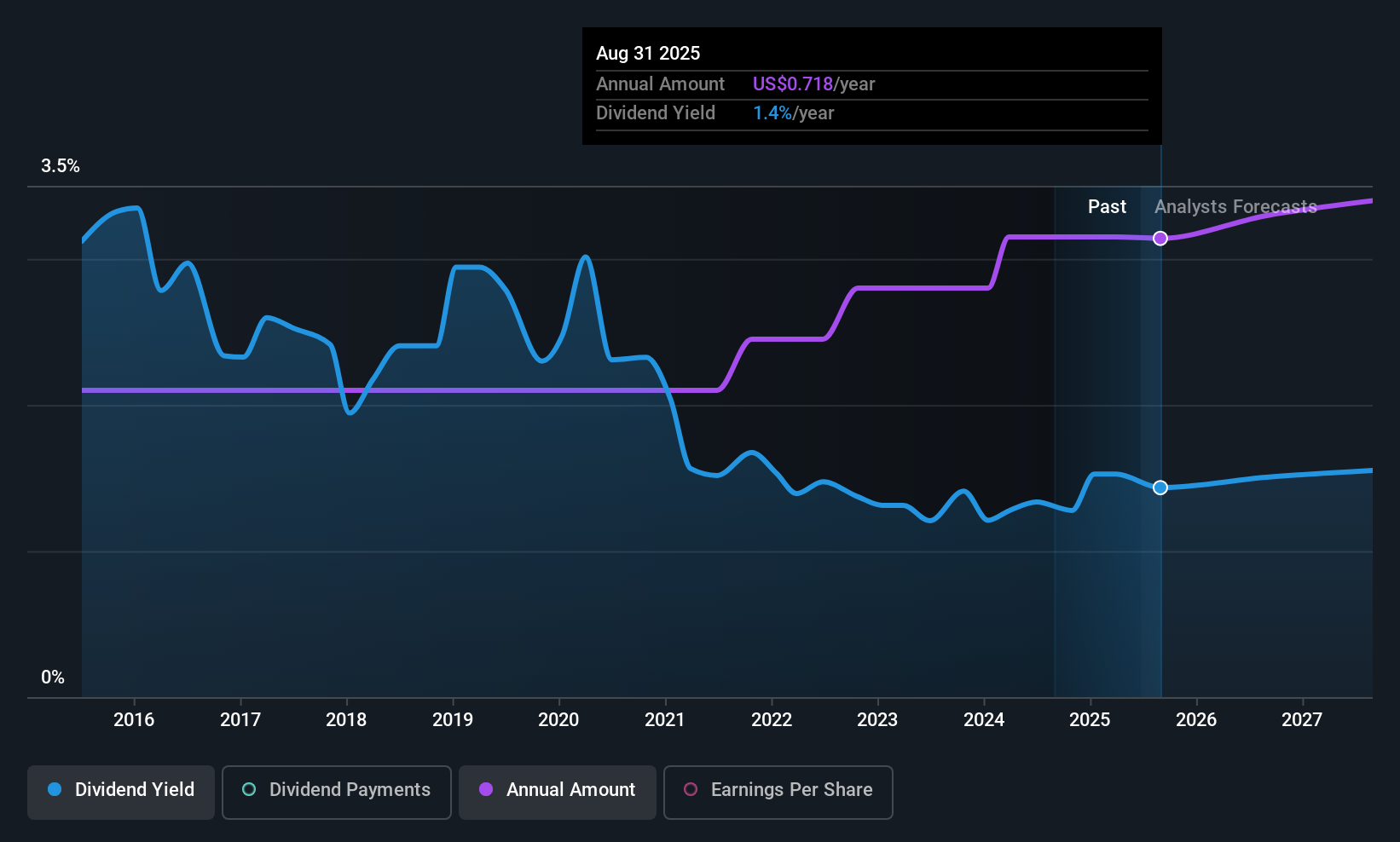
Commercial Metals Company (NYSE:CMC) is about to trade ex-dividend in the next 4 days. The ex-dividend date occurs one day before the record date, which is the day on which shareholders need to be on the company's books in order to receive a dividend. The ex-dividend date is important because any transaction on a stock needs to have been settled before the record date in order to be eligible for a dividend. Thus, you can purchase Commercial Metals' shares before the 30th of June in order to receive the dividend, which the company will pay on the 9th of July.
The company's next dividend payment will be US$0.18 per share, and in the last 12 months, the company paid a total of US$0.72 per share. Calculating the last year's worth of payments shows that Commercial Metals has a trailing yield of 1.4% on the current share price of US$50.05. We love seeing companies pay a dividend, but it's also important to be sure that laying the golden eggs isn't going to kill our golden goose! As a result, readers should always check whether Commercial Metals has been able to grow its dividends, or if the dividend might be cut.
Dividends are typically paid from company earnings. If a company pays more in dividends than it earned in profit, then the dividend could be unsustainable. An unusually high payout ratio of 222% of its profit suggests something is happening other than the usual distribution of profits to shareholders. A useful secondary check can be to evaluate whether Commercial Metals generated enough free cash flow to afford its dividend. The good news is it paid out just 22% of its free cash flow in the last year.
It's good to see that while Commercial Metals's dividends were not covered by profits, at least they are affordable from a cash perspective. If executives were to continue paying more in dividends than the company reported in profits, we'd view this as a warning sign. Very few companies are able to sustainably pay dividends larger than their reported earnings.
Check out our latest analysis for Commercial Metals
Click here to see the company's payout ratio, plus analyst estimates of its future dividends.

Have Earnings And Dividends Been Growing?
Businesses with shrinking earnings are tricky from a dividend perspective. If earnings fall far enough, the company could be forced to cut its dividend. Commercial Metals's earnings per share have fallen at approximately 28% a year over the previous five years. Ultimately, when earnings per share decline, the size of the pie from which dividends can be paid, shrinks.
The main way most investors will assess a company's dividend prospects is by checking the historical rate of dividend growth. Commercial Metals has delivered an average of 4.1% per year annual increase in its dividend, based on the past 10 years of dividend payments. That's intriguing, but the combination of growing dividends despite declining earnings can typically only be achieved by paying out a larger percentage of profits. Commercial Metals is already paying out 222% of its profits, and with shrinking earnings we think it's unlikely that this dividend will grow quickly in the future.
The Bottom Line
Should investors buy Commercial Metals for the upcoming dividend? It's never great to see earnings per share declining, especially when a company is paying out 222% of its profit as dividends, which we feel is uncomfortably high. However, the cash payout ratio was much lower - good news from a dividend perspective - which makes us wonder why there is such a mis-match between income and cashflow. It's not an attractive combination from a dividend perspective, and we're inclined to pass on this one for the time being.
With that in mind though, if the poor dividend characteristics of Commercial Metals don't faze you, it's worth being mindful of the risks involved with this business. To help with this, we've discovered 2 warning signs for Commercial Metals that you should be aware of before investing in their shares.
If you're in the market for strong dividend payers, we recommend checking our selection of top dividend stocks.
Have feedback on this article? Concerned about the content? Get in touch with us directly. Alternatively, email editorial-team (at) simplywallst.com.
This article by Simply Wall St is general in nature. We provide commentary based on historical data and analyst forecasts only using an unbiased methodology and our articles are not intended to be financial advice. It does not constitute a recommendation to buy or sell any stock, and does not take account of your objectives, or your financial situation. We aim to bring you long-term focused analysis driven by fundamental data. Note that our analysis may not factor in the latest price-sensitive company announcements or qualitative material. Simply Wall St has no position in any stocks mentioned.